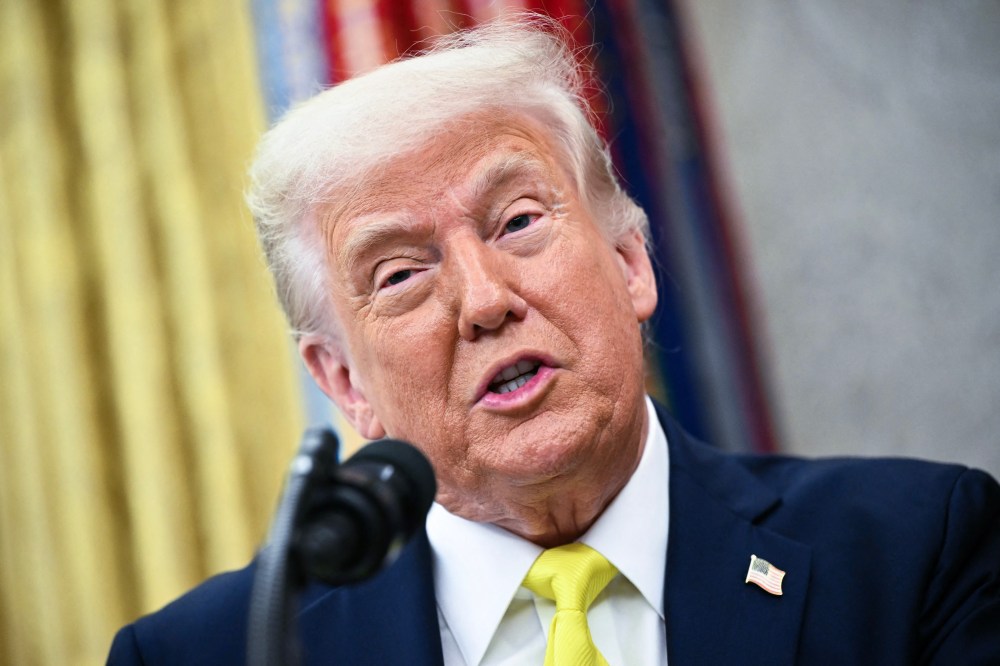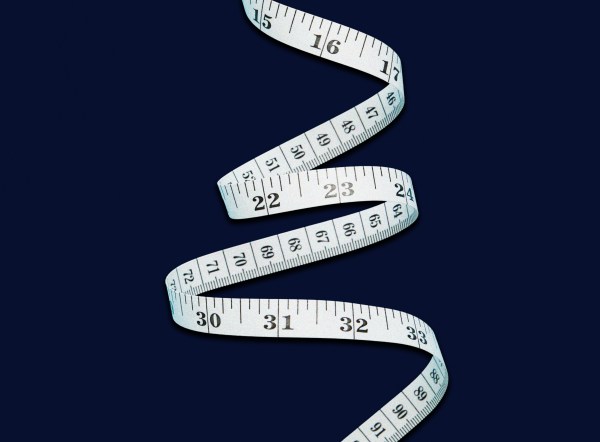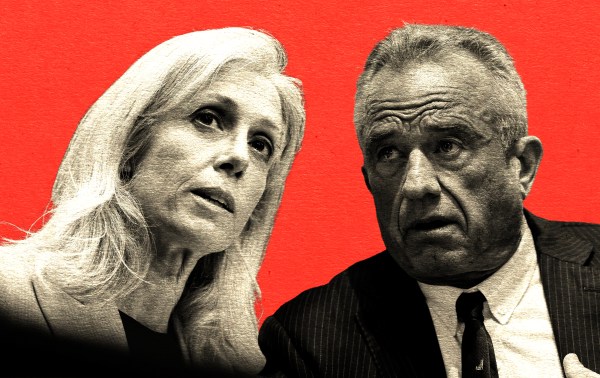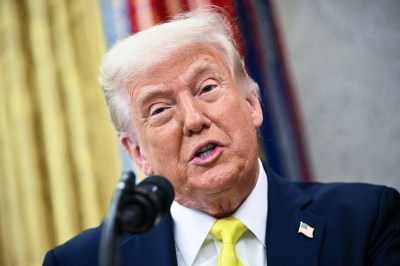So maybe Chuck Schumer was right.
Last month the Senate minority leader made an enemy of, well, just about every Democrat in the country when he opted not to filibuster a Republican funding bill. Liberals wanted their party to shut down the government and refuse to reopen it until the White House made concessions on … something. (It was never clear what.) That was the only bit of policy leverage they had at a moment when Republicans control everything in Washington—and Chuck Schumer declined to use it. Coward!
But the correct strategic move in hindsight, no?
Schumer feared that a Democrat-driven shutdown would do his side more harm than good. It would undermine years of left-wing criticism about the GOP’s “hostage-taking” around funding bills and would compound the damage DOGE layoffs have done to the federal bureaucracy by triggering furloughs. It would also hand the president an easy scapegoat for any economic troubles to come. If only Democrats hadn’t shut down the government, things in America would be much better!
Six weeks later, the troubles have arrived.
Schumer wagered that the best thing liberals can do right now to improve their political position is nothing. Stand aside, trust that Donald Trump and his party will make an unholy mess of things, and deprive Republicans of any excuse that the left is somehow responsible for the country’s misfortunes. By averting a shutdown, Democrats have won the blame game in a rout: Unambiguously, the darkening economic forecasts since “Liberation Day” are due entirely to the president’s imbecilic trade war.
And voters know it.
There are too many new national polls to summarize as we approach the end of Trump’s first 100 days, but this will give you the flavor at a glance. His approval numbers with independents have turned gruesome, routinely in the 30s and in two surveys (one of them from Fox News) in the 20s. His support among Hispanics, a key working-class bloc, has collapsed. CNN’s latest poll finds his national approval at 41 percent, the worst for any president this early in his term since such polling began in the 1950s.
Trump’s approval on the economy, traditionally his strongest issue, has fallen 20 or so net points on average since January and is now underwater by double digits. Just 35 percent of Americans approve of how he’s handling tariffs, per the Washington Post. When Gallup asked the public whether they believe tariffs will make money or cost money for the United States long-term, respondents split 36-62; when the New York Times asked whether they believe America mostly benefits or is mostly harmed by foreign alliances and trade, the split went 68-24.
The president’s numbers on his other bread-and-butter issue aren’t much better. Americans are trending pro-immigration as they recoil from his more abusive policies and, according to the Times and Post surveys, now disapprove of how he’s handling the issue on balance. ABC News found more adults favor returning Kilmar Abrego Garcia to the U.S. than oppose doing so, and majorities in multiple polls say foreign students shouldn’t be deported for their political views about the Middle East. Per ABC, the president’s approval among Hispanics on immigration now stands at—deep breath—32-67.
The only reason his overall national job approval remains above 40 percent is because of the North Korean level of support he enjoys among Republicans, and even that might plausibly start to crack in the next few weeks.
In a normal presidency, a polling drop this steep this soon would trigger a hasty shift to Plan B at the White House, whatever “Plan B” might be. The president got elected promising Americans that he’d fix the economy and immigration enforcement and he’s gone bust on both issues not even 100 days in.
But this isn’t a normal presidency, it’s a Trump presidency. In a Trump presidency, does collapsing popular support matter at all? How should we expect politics to change, or not change, because of it?
Plan B.
The usual problems with predicting how a mentally unstable drama queen might behave has an extra complication in this case. Trump’s two defining characteristics, his narcissism and his authoritarianism, are in conflict.
An authoritarian, especially one who seems to believe he was spared from death by providence to realize his vision for America, shouldn’t care whether the public likes or dislikes his policies. Governing without being accountable to a democratic majority is the whole point of authoritarianism, in fact, and triply so when you’re term-limited (hopefully!), approaching 80, and indifferent to how your unpopularity might imperil other elected officials in your party. He also faces zero risk of impeachment from a Congress controlled by his party, no matter how corruptly he behaves. Possibly no president in American history has been as comprehensively insulated from public opinion as Trump is.
But he’s a narcissist and so he can’t help caring what others think of him. For all the psychological mechanisms Trump has developed to cope with evidence of his unpopularity—The polls are fake! The election was rigged!—there’s no spinning the vote of no confidence in his trade policies delivered by the stock and bond markets after “Liberation Day.” Last fall Americans vouched for his economic competence by deciding they’d tolerate four years of daily insanity in return for the pre-inflation economy of 2019; what they’re staring at instead is four years of daily insanity and a worse economy than they had under Joe Biden. That’s the president’s legacy unless something changes, and there’s reason to think he’s sensitive to it.
And something has changed. He “paused” his trade war, and odds are very good that he’s never going to unpause it.
The fact that he moved so quickly to scale back his new tariffs and has been at pains to say that he wants a deal with China makes me think those tariffs are gone for good. In theory they'll go back into effect automatically after the 90-day “pause” ends but in practice it’s unimaginable that the White House will let that happen once public anger erupts over foreign goods disappearing from American store shelves. If Trump manages to escape from this episode without thoroughly debilitating his own economy, even he isn’t so stupid (famous last words!) as to blow up his political support again with another try at “Liberation Day” a year or two down the road.
Our short national nightmare with tariffs is over, certainly with respect to nations not named “China” and possibly with respect to that one too.
Taxes.
Trump’s polling collapse might also change the calculus on the tax-cuts mega-bill that Republicans in Congress are trying to negotiate.
The more likely a tariff-induced recession seems, the better the bill’s odds of passing should be. Facing a midterm wipeout, conservative skeptics in the House might resolve to suck it up and support the legislation in the belief that this is their last chance to pass something meaningful before losing power. The president will sell the tax cuts to them as an urgently needed stimulus for the shrinking economy and a financial cushion for Americans facing a tough job market. It’ll be even harder for them to say no than it is now.
He might also pressure congressional Republicans to ease off on demanding spending cuts. Federal spending is another stimulus that Americans soon might not be able to do without, especially welfare programs on which lower-class MAGA voters depend. Steve Bannon, one of the more ideological populists inside Trump’s tent, has warned the White House for months not to pull the Medicaid rug out from under blue-collar red-staters. With the president now bleeding support from working-class groups like Hispanics, he and his allies in Congress may feel they have no choice but to take Bannon’s message to heart.
(Sharp tax cuts plus few spending cuts would mean a ginormous budget deficit next year. But what else is new?)
On the other hand, congressional majorities don’t typically become more willing to follow an unpopular president’s lead as his support crumbles, do they? Never before in the Trump era have House and Senate Republicans had less to fear electorally from GOP voters by breaking with the president than they’ve had to fear from general election voters by siding with him. But we might be there soon: If Trump’s polling slips further, Republicans from purple states and districts will ponder whether tanking his tax-cuts bill gives them a slightly better chance at being reelected than passing it would.
And if it slips a lot, their odds of reelection might slide so far that some opt to retire, allowing them to vote however they like on that bill and any others that might reach the floor before they leave office in 2027 without fear of repercussions. (Electoral repercussions, anyway.) It’s hard to imagine the president losing control of Congress, but an approval rating in the low 30s that turns vulnerable Republicans into the walking dead is our best shot.
Trump, meanwhile, would have trouble resisting his demagogic instincts during a sharp recession for which he’s entirely to blame. For the moment, aides seem to have convinced him that threatening to fire Federal Reserve Chairman Jerome Powell will only make his predicament worse. But if the Fed moves slowly to lower interest rates amid an economic slump over inflation fears—which will rise once foreign goods become scarce—an antsy Trump will chafe at having to refrain from treating him as a scapegoat. He’s not known for his patience, you know.
Ditto for raising taxes on the rich, a subject that’s come up in his talks with congressional Republicans over the mega-bill. The president sometimes sounds intrigued by the idea and sometimes not (again, what else is new?); in theory, as the odds of a recession rise, he’ll grow more reluctant to add any new drag on the economy by hiking taxes. But Trump being Trump, he might come to view attacks on the rich as a fast, easy way to rebuild his depleted support among the working class. A guy capable of believing that tariff revenue can entirely replace federal income tax revenue is certainly capable of believing that the solution to all of America’s economic problems lies in raising rates a few points on fatcats like his pal Elon. Especially if doing so looks like it’ll be worth a few points to him in polling.
Restraint?
America hasn’t been very lucky of late, but I think we got lucky that Trump launched his “Liberation Day” trade war before attempting the most aggressive power grabs in the postliberal playbook.
He could have done things differently. Having won the popular vote, briefly enjoyed majority approval in polling, and at last convinced the American establishment that Trumpism is here to stay, he entered office this year with more political capital than he had at any point in his first term. He was genuinely popular when he was sworn in on January 20. He could have spent that political capital any way he liked, such as by playing it safe on the economy and instead picking constitutional fights on politically favorable terrain to test the Supreme Court’s legitimacy. A public that was inclined to give the new strongman president the benefit of the doubt might have taken his side.
Instead he spent his political capital on the dumbest (and shortest?) trade war in history. As of this week, 64 percent of Americans now say he’s gone too far in trying to expand the powers of the presidency. Asked whether Trump’s administration is or isn’t obliged to follow a court ruling, they split 78-19. A mere 10 percent support his plan to send U.S. citizens to El Salvador for imprisonment, and nearly 60 percent describe his presidency to date as “scary.”
“Scary” isn’t a great starting point for the White House in a battle with institutions like the courts for the public’s loyalty. Nor is his declining job approval a sturdy foundation for the culture of intimidation he’s trying to build. “Looking at these polls, Democrats will presumably be less hesitant in their opposition to the administration,” Bill Kristol wrote of Trump’s numbers today at The Bulwark. “Nongovernmental institutions—universities, law firms, businesses—may be less inclined to accede to, and more willing to stand up to, Trumpist intimidation (and, indeed, we may be seeing instances of this). Judges may be less worried about upholding the rule of law against the Trump administration.”
Even on issues like foreign policy that are typically seen as distinct from the economy, Trump has begun to lose the benefit of the doubt. According to the Times, his approval rating on handling the war between Ukraine and Russia stands at 35-56. Across the board, on issue after issue, Americans smarting from the tariff disaster are simply less likely to rationalize his illiberalism than they were three months ago. Which is as close as we’ve come in a long time to seeing green shoots in the civic wasteland that this country has become.
None of this guarantees that Trump will be less aggressive in testing the limits of his power going forward. It could be the opposite: If and when he’s convinced that he’s lost the public’s support irretrievably, he might conclude that there’s nothing left to lose in trying to consolidate power by any means necessary. Or he might reason that he needs to do something really bold and nationalistic to inspire the public to rally behind him—like attacking Iran, say, or invading Greenland.
Every time he’s hit a wall professionally, from corporate bankruptcies to coup plots to criminal indictments, he’s doubled down on aggression and plowed ahead. It’s worked out okay for him. Why would he change now?
But my guess is that the traumatic, aura-shattering reality of sinking markets and a sinking economy will make Trump less aggressive, at least for a while. Per the tariff “pause,” it already has. Narcissist that he is, he’ll probably never let himself believe that Americans have given up on him entirely; all he needs to do, he might tell himself, is not antagonize voters further by doing other hideously unpopular things (like invading Greenland) in the near term, wait for job growth to rebound, and all will be well.
Savor this irony, in fact: One of Trump’s ugliest authoritarian impulses may prove to be a useful restraint on his behavior as his polling deteriorates.
That would be his obsession with running for an unconstitutional third term in 2028, the latest presidential scheme to begin as “kidding on the square” before turning more serious over time. His company has begun selling “Trump 2028” merchandise; “I am being inundated with requests” to run again, he told Time magazine last week. A term-limited authoritarian has no reason to care whether the public does or doesn’t approve of his job performance …
… But an authoritarian who stupidly believes he’s not term-limited does. Trump won’t be president in 2029 as long as the Constitution remains the law of the land but if convincing himself that he might be leads him to abandon policies that voters despise, that’s not the worst thing in the world.
And even if he doesn’t abandon those policies, there’s civic value in having him go on babbling about 2028 as his public support disintegrates. The president was reelected because too many Americans persuaded themselves that he wasn’t the wannabe caudillo that people like me claimed he was. (“He *did* eventually leave after attempting that coup, didn’t he?”) To hear him fantasize about an illegal third term as the U.S. economy circles the drain might finally sober some of them up: A guy who’s this fixated on maintaining power indefinitely even as he goes about wrecking their lives perhaps doesn’t have their best interests at heart.
“I run the country and the world,” he boasted in a new interview with The Atlantic, somehow overlooking that the chief lesson of his trade war is that America can’t actually dictate terms to planet Earth. It’s one thing to crave supreme power while making the trains run on time, though, and quite another to do it in the midst of making them break down. I think that’s the takeaway from the current polling, which, in a better world, would be worse than it is. But green shoots are better than nothing.







Please note that we at The Dispatch hold ourselves, our work, and our commenters to a higher standard than other places on the internet. We welcome comments that foster genuine debate or discussion—including comments critical of us or our work—but responses that include ad hominem attacks on fellow Dispatch members or are intended to stoke fear and anger may be moderated.
With your membership, you only have the ability to comment on The Morning Dispatch articles. Consider upgrading to join the conversation everywhere.